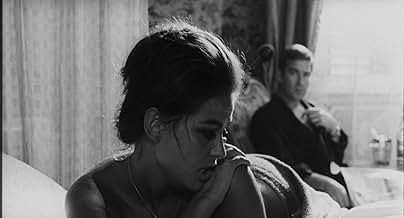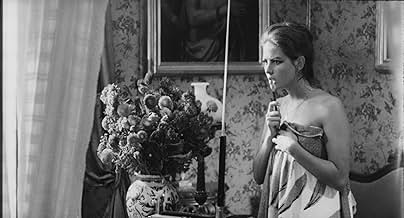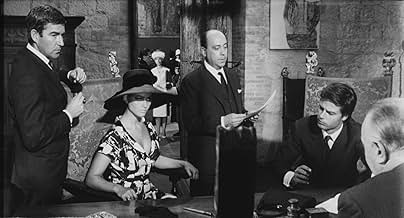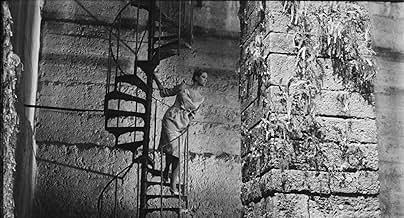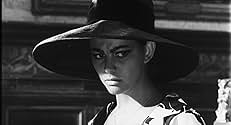IMDb RATING
7.1/10
2.4K
YOUR RATING
Sandra returns to her childhood village to take care of family business, but her childhood memories and secrets soon overcome her.Sandra returns to her childhood village to take care of family business, but her childhood memories and secrets soon overcome her.Sandra returns to her childhood village to take care of family business, but her childhood memories and secrets soon overcome her.
- Awards
- 3 wins & 2 nominations total
Oscar Brazzi
- Party Guest
- (uncredited)
Glenn Saxson
- Party Guest
- (uncredited)
Featured reviews
After a farewell party, Sandra Dawson (Claudia Cardinale) and her American husband Andrew Dawson (Michael Craig) travel to her hometown in the province of Volterra for a homage of the locals to her father, a prominent scientist that died in the concentration camp of Auschwitz. The couple is welcomed by the maid Fosca (Amalia Troiani), and Andrew becomes fascinated with the house. Sandra has issues with her stepfather Pietro Formari (Fred Williams) and her insane mother (Marie Bell) and misses her brother Gianni Wald-Luzzati (Jean Sorel), who is an aspirant writer. When Gianni appears in the house out of the blue, Andrew unravels a shadowy secret from the past of the siblings.
The unknown "Vaghe Stelle dell'Orsa..." is another great movie of this artist called Luchino Visconti. The plot about incestuous relationship and family issues in the hands of another director could have become a melodramatic soap-opera. But Visconti explores the sensuality and beauty of Claudia Cardinale to deliver an intriguing and quite erotic family drama without any redemption. The set decoration, as usual, is another piece of art, supported by a classy music score. My vote is eight.
Title (Brazil): Not Available
The unknown "Vaghe Stelle dell'Orsa..." is another great movie of this artist called Luchino Visconti. The plot about incestuous relationship and family issues in the hands of another director could have become a melodramatic soap-opera. But Visconti explores the sensuality and beauty of Claudia Cardinale to deliver an intriguing and quite erotic family drama without any redemption. The set decoration, as usual, is another piece of art, supported by a classy music score. My vote is eight.
Title (Brazil): Not Available
As they say, the characters in this movie are based on the Greek mythology, namely, the killed father (Agamemnon), his wife (Clytemnestra), her new husband (Aegisthus), the daughter, Sandra (Electra), the son, Gianni (Olestes) and ex-boyfriend of the daughter, Pietro (now he is a doctor but he comes form a tenant farmer family like in the original), and the Trojan War is replaced with the Second World War ... the story line is difficultly categorized into a direct adaptation like Mourning Becomes Electra (an O'Neill's play, made into a movie by Dudley Nichols 1947), however, it follows the traditions of the Greek tragedies : the past and the blood dominate and determine every destiny of the characters.
Here, Andrew (the outsider) is an interesting character. Innocently, (without receiving an oracle!), he analyzes 'the curse' of the dead father rationally, objectively and very ordinarily in vain and opens Pandora's box with his 'good' foolhardiness. Besides, he judges Gianni according to 'his' ethics as a total stranger and raises his fist against his brother-in-law. And still he is never involved in the mythology and should walk away forever. Is he an incarnation of our prosaic civilization of today? The establishment that he is an American (who has a camera!) could be an irony in Visconti's own way?
By the way, recently I watched Desperate Housewives, season 2, Episode 9, "That's Good, That's Bad", and suddenly I remembered the scene in which Gianni takes out the pills and threatens Sandra : George who took the pills menaces Bree ... (so I'm writing this comment now, but I know it's an exaggerated analogy, anyway....)
Jean Sorel is heavenly beautiful. The scene in the water tower takes my breath away. César Franck's music suits the aestheticism of the director, too.
If you are an amateur of Visconti's works, you might know this one doesn't end just as in the original script. Do you think Sandra flies across the ocean to join Andrew or she buries herself in her destined blood there eternally?
Including Mourning Becomes Electra, it could be interesting to refer to also : 1. Les Enfants terribles / Jean-Pierre Melville (1950) 2. Höhenfeuer /Fredi M. Murer (1985) 3. Jeux d'artifices / Virginie Thévenet (1987) 4. La Banyera / Jesús Garay (1989 / fantastic!)
Here, Andrew (the outsider) is an interesting character. Innocently, (without receiving an oracle!), he analyzes 'the curse' of the dead father rationally, objectively and very ordinarily in vain and opens Pandora's box with his 'good' foolhardiness. Besides, he judges Gianni according to 'his' ethics as a total stranger and raises his fist against his brother-in-law. And still he is never involved in the mythology and should walk away forever. Is he an incarnation of our prosaic civilization of today? The establishment that he is an American (who has a camera!) could be an irony in Visconti's own way?
By the way, recently I watched Desperate Housewives, season 2, Episode 9, "That's Good, That's Bad", and suddenly I remembered the scene in which Gianni takes out the pills and threatens Sandra : George who took the pills menaces Bree ... (so I'm writing this comment now, but I know it's an exaggerated analogy, anyway....)
Jean Sorel is heavenly beautiful. The scene in the water tower takes my breath away. César Franck's music suits the aestheticism of the director, too.
If you are an amateur of Visconti's works, you might know this one doesn't end just as in the original script. Do you think Sandra flies across the ocean to join Andrew or she buries herself in her destined blood there eternally?
Including Mourning Becomes Electra, it could be interesting to refer to also : 1. Les Enfants terribles / Jean-Pierre Melville (1950) 2. Höhenfeuer /Fredi M. Murer (1985) 3. Jeux d'artifices / Virginie Thévenet (1987) 4. La Banyera / Jesús Garay (1989 / fantastic!)
Luchino Visconti often dealt with the disintegration of family in his films; The Damed, The Leopard, Conversation Piece.. The stories were tragedies and only in Bellissima (1951) the family sticked together in the end. Sandra (Vaghe stelle dell'Orsa...) is also a film about this, but specifically about an aristocratic family full of betrayal, decay and immorality.
Incest is a leading theme in Sandra; we are given clues about it throughout the film, but not a definite proof. The affair of the siblings remains in the shadows and there's something odd in the relationships between the children and the parents. Visconti first approaches this controversial theme calmly, showing it as a small thing - we are not told much about it. But then he increases it to enormous dimensions.
Luchino Visconti sets this story to a dying city around a aristocratic class that is dying out. Great tragedies, misfortunes and decay lead this class to extinction. Already in Senso Visconti achieved an aesthetic revolution, but he continues this in Sandra with a political and ethic revolution. Sandra is not the easiest film by Visconti and many people in the theater seemed to neglect it. In the beginning I found it a little unreachable and absurd but it grew up to be a beautiful allegorical description of the decay of an aristocratic family.
Incest is a leading theme in Sandra; we are given clues about it throughout the film, but not a definite proof. The affair of the siblings remains in the shadows and there's something odd in the relationships between the children and the parents. Visconti first approaches this controversial theme calmly, showing it as a small thing - we are not told much about it. But then he increases it to enormous dimensions.
Luchino Visconti sets this story to a dying city around a aristocratic class that is dying out. Great tragedies, misfortunes and decay lead this class to extinction. Already in Senso Visconti achieved an aesthetic revolution, but he continues this in Sandra with a political and ethic revolution. Sandra is not the easiest film by Visconti and many people in the theater seemed to neglect it. In the beginning I found it a little unreachable and absurd but it grew up to be a beautiful allegorical description of the decay of an aristocratic family.
Deserved the Golden Lion at Venice. Powerful at all times except for its below average beginning. Then it changes gears.
The film is typical Visconti--a well-to-do upper class family returning to the childhood manor, picking up the memorable pieces of a rich and comfortable past before the World War II (literally in the film, the sale of valued paintings, property, and in this film, a garden that needs costly upkeep forcing the family now to gift it to the townsfolk as public property). Touches of Visconti's and Lampedusa's "The Leopard" made just before this film.
The original head of the family, Sandra's father was a Jew, and executed by the Nazis. He was exposed as a Jew by his wife, a famous pianist who fell in love with a lawyer. Sandra suspects the lawyer and her mother for her father's demise. Visconti never reveals why the Nazis spared the family members. Now Sandra's mother is demented and her father's statue in the garden is always covered in a white sheet giving the suggestion of a ghost. But the film is not about ghosts.
The film is more about Sandra (Cardinale) and her brother Gianni (Sorel) who reveal an past that might never have been consummated. Now that Sandra is married to Andrew (Craig), Gianni removes the wedding ring from Sandra's finger and wears it, Sandra's protests unheeded.
Visconti's script reveals that Sandra had a lover, Antonio (who still adores her, played by Ricci), but they could not marry because of the class divide and opposition from her mother to the relationship. Years later Antonio becomes a doctor who treats Sandra's demented mother.
While the film is not about ghosts, it is about a dark past, bitter memories, class and religious conflicts, that struggle to keep pace with the world outside the Italian town with a rich history. An electra complex emerges like a ghost--Visconti's images of Cardinale's body (especially her eyes that wonder who is outside her bedroom door) are absolutely top notch. There is no overt sex, no on screen and even the spoken words deny more than underscore it. you wonder about Sandra's mother if she is truly demented when she accuses her daughter Sandra of slithering in like a serpent.
Every bit of the film makes you wonder as you clutch at the straws the director throws as clues for the viewer to solve a big puzzle. The poem which provides the original Italian title of the film is one, There are more Solve them and you will love the film. Deserving of the Venice honor. Thank you, Cardinale and Sorel, for your unforgettable screen time in this film. A film that anticipates Visconti's "The Damned" and "Conversation Piece."
The film is typical Visconti--a well-to-do upper class family returning to the childhood manor, picking up the memorable pieces of a rich and comfortable past before the World War II (literally in the film, the sale of valued paintings, property, and in this film, a garden that needs costly upkeep forcing the family now to gift it to the townsfolk as public property). Touches of Visconti's and Lampedusa's "The Leopard" made just before this film.
The original head of the family, Sandra's father was a Jew, and executed by the Nazis. He was exposed as a Jew by his wife, a famous pianist who fell in love with a lawyer. Sandra suspects the lawyer and her mother for her father's demise. Visconti never reveals why the Nazis spared the family members. Now Sandra's mother is demented and her father's statue in the garden is always covered in a white sheet giving the suggestion of a ghost. But the film is not about ghosts.
The film is more about Sandra (Cardinale) and her brother Gianni (Sorel) who reveal an past that might never have been consummated. Now that Sandra is married to Andrew (Craig), Gianni removes the wedding ring from Sandra's finger and wears it, Sandra's protests unheeded.
Visconti's script reveals that Sandra had a lover, Antonio (who still adores her, played by Ricci), but they could not marry because of the class divide and opposition from her mother to the relationship. Years later Antonio becomes a doctor who treats Sandra's demented mother.
While the film is not about ghosts, it is about a dark past, bitter memories, class and religious conflicts, that struggle to keep pace with the world outside the Italian town with a rich history. An electra complex emerges like a ghost--Visconti's images of Cardinale's body (especially her eyes that wonder who is outside her bedroom door) are absolutely top notch. There is no overt sex, no on screen and even the spoken words deny more than underscore it. you wonder about Sandra's mother if she is truly demented when she accuses her daughter Sandra of slithering in like a serpent.
Every bit of the film makes you wonder as you clutch at the straws the director throws as clues for the viewer to solve a big puzzle. The poem which provides the original Italian title of the film is one, There are more Solve them and you will love the film. Deserving of the Venice honor. Thank you, Cardinale and Sorel, for your unforgettable screen time in this film. A film that anticipates Visconti's "The Damned" and "Conversation Piece."
An uneven entry in the Visconti canon, "Sandra Of A Thousand Delights" comes directly after "The Leopard", and while I consider "The Leopard" a masterpiece, it was still a film where Visconti was developing as a director, not really reaching the masterly stylistic highs of "The Damned" or "Death In Venice", but with a majestically deep plot that made up for any directorial deficiencies.
Now, "Sandra Of A Thousand Delights" is still a point in Visconti's career where he's developing as a director. He's close but he's not quite there. Shot in black and white, and with an overly dark photography that emphasizes the desolate feel, even though this is a highly intense drama - perhaps too dramatic for it's own good, it doesn't have the necessary substance to back up the plot. In the end it's just a family drama and nothing more, even if it's a forceful one: Sandra reunites with her family on the eve of her father's memorial service but there's two dark secrets lurking in the shadows; her incestuous affair with her brother, and her adulterous mother's dereliction of her husband (Sandra's father) in a concentration camp.
Now, "Sandra Of A Thousand Delights" is still a point in Visconti's career where he's developing as a director. He's close but he's not quite there. Shot in black and white, and with an overly dark photography that emphasizes the desolate feel, even though this is a highly intense drama - perhaps too dramatic for it's own good, it doesn't have the necessary substance to back up the plot. In the end it's just a family drama and nothing more, even if it's a forceful one: Sandra reunites with her family on the eve of her father's memorial service but there's two dark secrets lurking in the shadows; her incestuous affair with her brother, and her adulterous mother's dereliction of her husband (Sandra's father) in a concentration camp.
Did you know
- TriviaOne of the first films in which Claudia Cardinale, who was born in Tunisia and whose first language was French, dubbed herself in Italian.
- Quotes
Gianni Wald-Luzzati: Why can't you be honest for once? Did God tell you to become a nun? Did he tell you to get married and that would satisfy you? Did he tell you that nun's are sick with desire and frustration? That they're willing to mortify their flesh? Now, why must you torment yourself? Why should you fill so full of guilt? So wretched and alone?
- ConnectionsFeatured in Visconti (1967)
- SoundtracksPrelude, chorale and fugue
Written by César Franck
- How long is Sandra?Powered by Alexa
Details
- Release date
- Countries of origin
- Official site
- Languages
- Also known as
- Vagues étoiles de la grande ourse
- Filming locations
- Geneva, Canton de Genève, Switzerland(opening sequence: party at Sandra and Andrew's apartment)
- Production companies
- See more company credits at IMDbPro
Box office
- Gross worldwide
- $927
- Runtime
- 1h 45m(105 min)
- Color
- Sound mix
- Aspect ratio
- 1.66 : 1
Contribute to this page
Suggest an edit or add missing content

